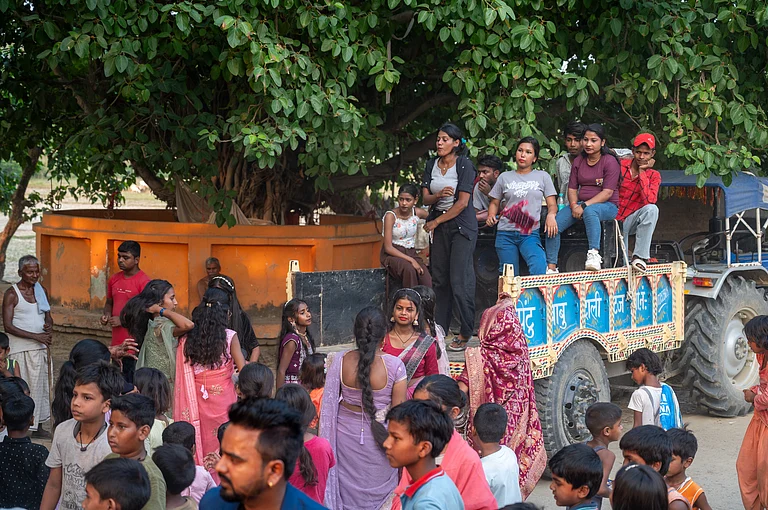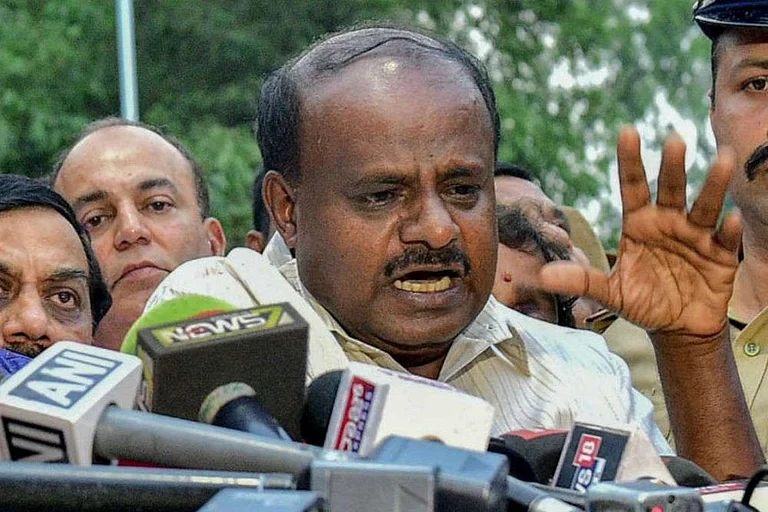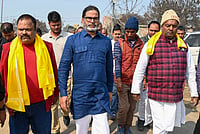
BJP’s Maithili Thakur, a popular folk singer from Mithila, has drawn attention by proposing to rename Alinagar as Sitanagar, invoking Goddess Sita and Maithil pride.
Hindutva Meets Heritage: Her campaign blends Maithili cultural identity with religious symbolism — a move supporters call cultural pride, while critics see it as a bid to consolidate Hindu votes.
Several BJP workers resent the “parachuting” of an outsider, saying the party ignored local leaders and weakened its grassroots base in Alinagar.
Until a few weeks ago, few outside Darbhanga had even heard of Alinagar. Today, the narrow lanes of this rural constituency are swarming with camera crews and political workers. Ever since the BJP announced Maithili as its candidate, Alinagar has found itself in the national spotlight.
The credit, in no small part, goes to Maithili herself — the young, classically trained folk and devotional singer who became the cultural face of Mithila through her renditions of bhajans and Maithili songs. For many outside Bihar, she is a brand ambassador of the state. But in Alinagar, where the rhythm of politics is slower than social media’s churn, Maithili is still an unfamiliar face to many.
As one of the youngest candidates in the Bihar elections, she has captivated urban, Gen Z audiences online. Yet, among Alinagar’s older rural women and men, curiosity, admiration and mild scepticism persist.
"I have listened to her songs. I love her. She is young. That is what we need," said Karuna, a farmer in her early thirties. For many the face of Prime Minister Narendra Modi is enough.
"Kids are quite excited. But I have not seen her videos. She seemed nice. I vote for Modi. He is giving us ration," said Sumita Devi, a pensioner in her late sixties.
Stitching Maithili Culture with Hindutva
During her campaign, Maithili has increasingly drawn on cultural and religious imagery, seeking to connect with Hindu voters through symbols of Mithila’s heritage. Her call to rename Alinagar as Sitanagar — invoking Goddess Sita who is deeply revered across the Mithila region — has become a talking point in local political circles. According to Valmiki Ramayana Sita was born in Mithila region.
“This land belongs to Maithil culture, to Sita Mata’s memory. It deserves a name that reflects our identity,” she told the crowd, drawing loud cheers from her supporters.
BJP leaders frame it as an attempt to restore the region’s ancient identity, while it is a calculated move to consolidate Hindu sentiment in a closely contested seat. By merging Maithil cultural pride with religious symbolism, Thakur is echoing a broader BJP strategy that blends regional identity with Hindutva to appeal to traditional and first-time Hindu voters alike.
Maithili presents herself as both daughter and devotee — clad in a saree, a paag (the Maithil headdress) resting on her head, and a mata ki chunari draped over her shoulders.
Her look fuses regional pride with Hindu symbolism, aligning the Maithili cultural identity with the Hindutva-inflected imagery of the BJP’s campaign.
“Everyone starts from zero. This is the beginning of a long journey,” she told Outlook, walking through Ganaun village, dismissing criticism about her political inexperience. Yet her challenges run deeper than stagecraft.
Resentment Among BJP Supporters
Maithili faces a quiet rebellion within the BJP’s local ranks. Several long-time party workers are uneasy with what they call the “parachuting” of a celebrity candidate from outside the constituency.
Maithili hails from the Benipatti Assembly seat in neighbouring Madhubani district.
The BJP’s logic in fielding her is straightforward: her Maithili identity resonates across the Mithila region, offering the party a cultural and emotional bridge to young voters.
Still, resentment simmers. “The local people don’t want to vote for her because she’s an outsider,” said Vivek, a BJP worker in Alinagar. “For the last five years, voters here were unhappy with Misri Lal, the incumbent MLA from the Vikassheel Insan Party. We wanted a local BJP leader to be given a chance. But the party forced an outsider on us.”
“Top BJP leaders are coming here to campaign for her, but many local workers are not with her,” he added. “Binod Mishra from the RJD will win because he’s local — and even BJP supporters like me will vote for him.”
As he spoke, Manoj Tiwari’s campaign jingle — “Haan hum Bihari hain ji, thode sanskari hain ji” — blared from a loudspeaker, mingling politics with pop culture.
Campaign Chaos and the Learning Curve
That discontent has sometimes spilled onto the trail. In Ganaun village, a few women party workers hurriedly gathered a small crowd to cheer for Maithili. But coordination seemed lacking — confusion broke out over whether she should walk, ride a bike, or take a car through the narrow lanes.
She appeared momentarily unsure but quickly recovered, raising both hands to the crowd, smiling as elderly women blessed her and the young took selfies. For many, this was the first time a social-media celebrity had entered their dusty village.
The Outsider Debate
The “outsider” tag has dogged her campaign from the start. A recent video showing people chanting “Maithili go back” went viral, though BJP workers claimed it was misleading.
“There were many aspirants preparing to contest from this seat,” she said, addressing the controversy. “Initially, I had to counter allegations that I was being parachuted here, but that’s no longer an issue.”
“I tell people that I am Maithili from Mithila. I can’t describe the love I’m getting here,” she said, stepping carefully on a muddy road after a drizzle, while a camera crew jostled nearby for an interview.
A Last-Minute Candidature, A Tight Race
Maithili’s campaign has been a sprint from the start. The BJP announced her candidature on October 15; she filed her nomination two days later, leaving less than three weeks to reach out to 2.84 lakh voters before the November 6 polling.
She has drawn heavyweight backing — Home Minister Amit Shah held a rally for her, Chief Minister Nitish Kumar joined a roadshow, and Union Minister Dharmendra Pradhan, the BJP’s Bihar poll in-charge, has been closely monitoring her campaign.
Local BJP volunteers describe her campaign as an attempt to blend Mithila pride, Hindutva symbolism, and a governance pitch into a single narrative.
The Caste Chessboard and Electoral Arithmetic
Alinagar is no easy ground for experiments. The seat has swung narrowly in recent elections. In 2020, Misri Lal Yadav (then with the VIP) won with 61,082 votes (38.6 per cent) against RJD’s Binod Mishra (57,981 votes, 36.7 per cent) — a razor-thin margin of just over 3,000 votes. Turnout hovered around 57 per cent.
The constituency’s demographic mix — Brahmins, Yadavs, and Muslims forming major blocs — makes electoral alliances delicate. Scheduled Castes comprise around 11 per cent of voters.
Here, caste arithmetic and booth-level mobilisation often outweigh visibility or fame. That’s what Maithili, with her limited local roots, must overcome — and she’s relying heavily on the BJP’s organisation to do it.
“Celebrity vs Service”
“We like her songs, but our concerns are about drains, schools, and medicines,” said Rajesh Mishra, a shopkeeper in his thirties. His sentiment reflects a larger pattern — admiration tinged with scepticism.
RJD workers are consciously framing the contest as “celebrity versus service,” seeking to portray their candidate, Binod Mishra, as a dependable local figure. Yet among younger voters, Maithili’s digital charisma and familiarity with Mithila’s folk idiom appear to have genuine traction.
Several local cultural groups have begun organising small performances and social-media drives in her name. Her campaign has drawn volunteers from beyond traditional party networks — particularly youth influencers and digital activists.
Despite the energy around her campaign, the real test will be organisational — the unglamorous grind of voter slips, booth agents, and turnout management. Alinagar’s politics rewards networks over novelty. Maithili’s star power may help narrow the gap, but whether it can rewrite the caste calculus remains to be seen.





























